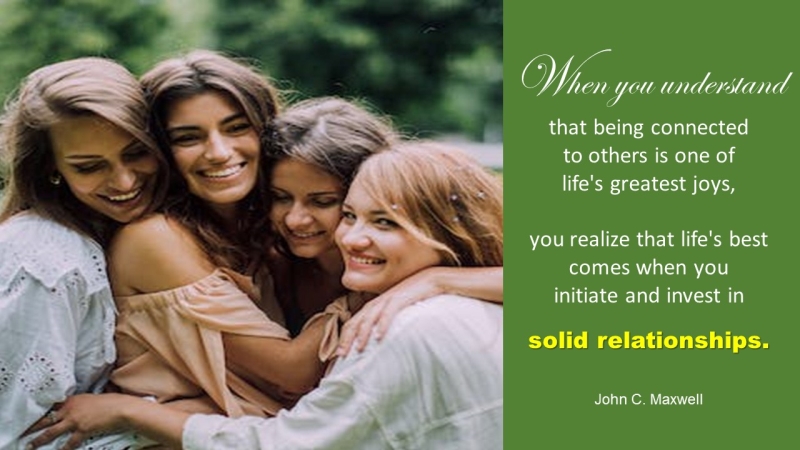WHY DO SOME PEOPLE SEEM HAPPIER THAN OTHERS? What makes them so successful, happy, and satisfied? While many factors contribute to a fulfilling life, one of the most important is the quality of our relationships.
Meaningful relationships bring joy, support, and purpose to our lives. They give us a sense of community and support our personal development. Whether it’s with family, friends, or colleagues, building and nurturing meaningful relationships can profoundly impact our overall well-being and success.
In this article, we’ll explore how to nurture meaningful relationships and reap the rewards that come with them. We’ll examine the benefits of meaningful relationships and the critical components of a meaningful relationship and offer tips on how to communicate effectively, practice empathy and compassion, make time for your relationships, and nurture them over time. Let’s dive in!
The Benefits of Meaningful Relationships
Meaningful relationships are an essential ingredient for a fulfilling life. They offer a wide range of benefits, from improved mental and physical health to personal growth and happiness. Here are some of the ways that nurturing meaningful relationships can positively impact your life:
Improved Mental Health
Meaningful relationships give us a sense of belonging, support, and purpose. They help us feel valued, understood, and appreciated. When we have strong relationships, we are less likely to feel lonely, anxious, or depressed. Research has shown that people with supportive relationships have better mental health outcomes and are better equipped to manage stress and adversity.
Improved Physical Health
Believe it or not, the benefits of meaningful relationships also extend to our physical health. Studies have found that people with strong social support networks have lower rates of chronic illness, including heart disease, stroke, and diabetes. They also tend to have better immune system function, heal faster from injuries, and live longer than those who lack social support.
Increased Happiness
There’s no denying that meaningful relationships bring us joy and happiness. Spending time with people we care about, doing things we enjoy, and creating joyous memories all contribute to our overall satisfaction. Moreover, the social support we receive from our relationships can help us to manage negative emotions, cope with setbacks, and maintain a positive outlook on life.
Personal Growth
Finally, meaningful relationships provide us with opportunities for personal growth and self-discovery. They challenge us to be more patient, empathetic, and understanding. They offer us different perspectives, introduce us to new experiences, and help us to learn about ourselves and others. By investing in our relationships, we can become better versions of ourselves and reach our full potential.
The benefits of meaningful relationships are undeniable. They offer us a wide range of advantages, from improved mental and physical health to increased happiness and personal growth. By recognizing the benefits of meaningful relationships, we can prioritize and invest in them, leading to a more fulfilling and satisfying life.
What Make a Relationship Meaningful
Meaningful relationships are built on mutual respect, trust, communication, and support. These fundamental components are what make a relationship meaningful and rewarding. Let’s analyze each component.
Mutual Respect
Respect is an essential component of any meaningful relationship. It involves recognizing and valuing the other person’s unique qualities, opinions, and perspectives. When we respect someone, we treat them with kindness, consideration, and empathy. We try to understand their point of view and show appreciation for their contributions. Mutual respect is the foundation for a healthy and fulfilling relationship.
Trust
Trust is another essential component of a meaningful relationship. It involves having confidence in the other person’s reliability, honesty, and integrity. When we trust someone, we feel safe and secure in the relationship. We are confident that the other person has our best interests at heart and will act in a way consistent with our expectations. Trust takes time, but it is vital to any meaningful relationship.
Communication
Effective communication is critical for maintaining a meaningful relationship. It involves expressing our thoughts, feelings, and needs transparently, respectfully, and honestly. It also involves active listening, paying attention to the other person, and responding to show we have understood and valued what they have said. When communication breaks down, misunderstandings and conflicts can arise, leading to the erosion of the relationship.
Support
Finally, meaningful relationships involve providing emotional, practical, and social support to one another. This means being there for the other person during stress, difficulty, or hardship. It also means celebrating their successes, encouraging their growth and development, and offering help and assistance when needed. Providing support is a powerful way to show love and appreciation for the other person and to build a robust and lasting relationship.
Meaningful relationships are built on mutual respect, trust, communication, and support. By understanding and prioritizing these key components, we can nurture our relationships and reap the rewards of a fulfilling and satisfying life.
Learning to Communicate Effectively
Effective communication is a critical component of building and maintaining meaningful relationships. It involves expressing our thoughts and feelings transparently, respectfully, and honestly. Effective communication also involves listening actively to the other person and responding in a way that shows we understand and value what they are saying. Let’s examine why effective communication is essential and some tips for improving communication skills.
The Importance of Effective Communication
Effective communication is essential for several reasons:
- Builds Trust: When communicating effectively, we build trust and establish a strong foundation for a meaningful relationship.
- Resolves Conflict: Effective communication can help resolve conflicts by allowing us to express our needs and feelings in a non-judgmental and respectful way.
- Enhances Intimacy: Effective communication can deepen intimacy and emotional connection by allowing us to share our thoughts, feelings, and experiences meaningfully.
Tips for Effective Communication
- Active Listening: Active listening is known as paying attention to the other person while responding in a way that demonstrates understanding and appreciation of what they have said. It consists of both verbal and nonverbal cues that demonstrate our interest in the conversation and the other person.
- Expressing Emotions: Effective communication involves expressing our emotions clearly and respectfully. Using “I” statements is essential to take responsibility for our feelings and avoid blame or criticism.
- Being Open and Honest: Effective communication requires being open and honest with ourselves and the other person. This means being authentic, transparent, and vulnerable when appropriate.
Forgetting to communicate effectively will make creating and maintaining meaningful connections challenging. By learning to communicate effectively, we can deepen our connections with others, resolve conflicts, and establish trust and intimacy. Remember to listen actively, respectfully express emotions, and be open and honest. With these skills, you can cultivate the rewarding and fulfilling relationships you deserve.
Practice Empathy and Compassion
Empathy and compassion are powerful tools that help you build and maintain meaningful relationships. Empathy lets you take another person’s perspective. This allows you to understand better their feelings and experiences, which can help you communicate more effectively and build a stronger bond with them.
Compassion is another essential ingredient in meaningful relationships. It involves showing kindness and understanding to others, even in difficult situations. When you are compassionate, you can offer support and comfort to those around you, which can help them feel heard, seen, and appreciated.
- Listen actively: One of the best ways to show kindness and compassion is to listen actively to those around you. This means paying attention to what they are saying, asking questions, and reflecting on what you hear to show that you understand.
- Put yourself in their shoes: Consider what it would be like to walk in someone else’s shoes. This can make you feel better and understand their viewpoint.
- Show understanding: Even if you disagree with someone’s point of view, you must show that you understand where they’re coming from. This can help them feel validated and respected.
- Be kind and supportive: Small acts of kindness and support can go a long way in building meaningful relationships. Whether offering a listening ear, helping, or simply sending a thoughtful text, showing compassion and support can help strengthen your connections with others.
Empathy and compassion can create a safe and supportive environment that fosters meaningful relationships. So, take the time to understand others’ perspectives, show kindness and support, and watch your relationships grow more robust and fulfilling.
Make Time for Your Relationships
Making time for your relationships is crucial to nurturing meaningful connections with others. It’s easy to become overwhelmed by life’s busyness and neglect your relationships. But neglecting your relationships can leave you feeling alone, unsupported, and lonely. The following advice will help you find time for your relationships:
Schedule Regular Time to Connect
- Set aside specific times in your schedule to connect with the essential people in your life.
- This could mean scheduling a weekly phone call with your long-distance friend or making a standing date night with your partner.
Be Present During Interactions
- When you spend time with the people in your life, ensure you’re fully present and engaged in the interaction.
- Put away distractions like your phone and listen to what they say.
- Show that you value your time together by being fully present in the moment.
Prioritize Your Relationships
- Make a conscious effort to prioritize your relationships.
- This might mean saying no to work commitments or other activities to spend time with loved ones.
- Remember that your relationships are as meaningful as other areas of your life and should be given the time and attention they deserve.
By making time for your relationships, you’re investing in your happiness and well-being, as well as the happiness and well-being of those around you. So schedule that coffee date with your friend or plan a weekend getaway with your partner. Your relationships will thank you for it.
Nurture Your Relationships Over Time
Maintaining meaningful relationships is not a one-time effort but an ongoing process. Like any living thing, relationships require constant care and attention to grow and thrive. Nurturing your relationships over time is essential to ensuring they remain strong and healthy. Here are some tips on how to enable your relationships:
Show Appreciation
Appreciating others is a great way to maintain relationships. Tell them you appreciate them and are grateful for them. Thank yous, and heartfelt notes can strengthen your relationship.
Be Patient and Forgiving
Everyone makes mistakes. In difficult times, patience and forgiveness are essential. Remember, it’s about understanding and supporting each other through thick and thin, not being right or wrong.
Be There for Others in Times of Need
The actual test of a relationship is how you show up when someone needs you the most. Whether lending a listening ear, offering encouragement, or simply being present, your support can make a big difference in someone’s life. Being there for someone during challenging times is a significant way to strengthen your bond.
Nurturing your relationships over time is critical to reaping the rewards of meaningful connections. Appreciation, patience, forgiveness, and helping others can build lasting relationships that enrich your life and those around you. Remember, healthy relationships require effort from both parties.
Conclusion
Meaningful relationships are crucial to our mental, emotional, and physical well-being; investing in them can bring many benefits. By understanding what makes a relationship meaningful, communicating effectively, practicing empathy and compassion, making time for our relationships, and nurturing them, we can cultivate solid and rewarding connections with the people in our lives.
So, whether it’s with our family, friends, or colleagues, let’s prioritize and invest in our relationships. Let’s be present, kind, and supportive and show appreciation, patience, and forgiveness. Doing so can build a fulfilling life rich with meaningful relationships that will bring us joy, growth, and success.
So, what are you waiting for? Start nurturing your relationships today, and reap the rewards for years to come.
CLICK THE IMAGE TO LEARN MORE




